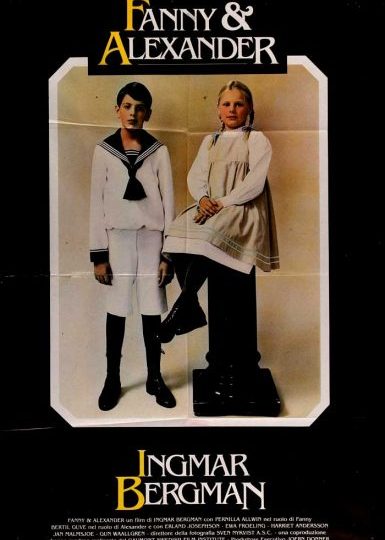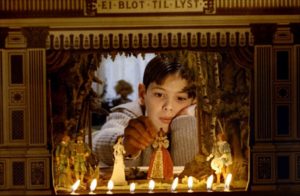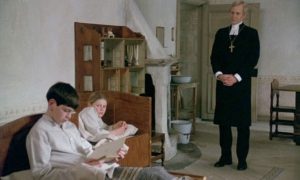
Fanny and Alexander (1982)
Director: Ingmar Bergman
Ingmar Bergman, born in 1918 and raised in the town of Uppsala in Sweden, was the son of a nurse and a strict Lutheran minister and chaplain. The brilliant director grew up in a highly religious universe, but later stated that his faith vanished at the age of eight. Bergman wrote in his autobiography, The Magic Lantern (1987), “Almost all of our education was based on concepts such as sin, confession, punishment, forgiveness and mercy… Punishments were completely natural, something that was never questioned. Sometimes they were quick and easy like slapping and spanking on the butt, but they could also take very sophisticated forms…”
The filmmaker’s education was very severe, and he always tried to combat the danger with the power of his own imagination. When he was nine, he traded a set of tin soldiers for a magic lantern. He created an inner magical world in which he felt safe, and began to create his own sceneries and marionettes, inspired by his religious world: “I devoted my interest to the church’s mysterious world of low arches, thick walls, the smell of eternity, the coloured sunlight quivering above the strangest vegetation of medieval paintings and carved figures on ceilings and walls. There was everything that one’s imagination could desire- angels, saints, dragons, prophets, devils, human…” Bergman later made puppet productions of Johann August Strindberg plays and had a career as a theater director, which culminated on engagements at the Royal Dramatic Theater in Stockholm on two occasions (1963-66 and 1985-95).
Since his beginnings in film, Bergman never stopped delving into his personal obsessions and demons, which made him a master of psychological and dialectical violence. In his films, the Swedish director magnificently captures the constant anguish of living and the fear of death, the feelings of guilt and insecurities that haunt people’s lives, God’s position in this, the difficulties of human relationships, and the role of art and the artist in society. Among his challenging and unconventional films, some impressive works must be highlighted: Wild Strawberries (1957), The Seventh Seal (1957), Through a Glass Darkly (1961), The Silence (1963), Persona (1966) or Cries and Whispers (1972).
In 1982, Bergman directed Fanny and Alexander, a brilliant semi-biographical masterpiece where he reflects his personal experiences. The characters Alexander, Fanny and stepfather Edvard are based on himself, his sister Margareta and his father Erik Bergman. The widely distributed version of the film is 188 minutes long, but was originally intended as a 4-part film with a total length of 312 minutes. No matter which version you decide for, watching it will be a mind-blowing experience.
 The story begins with a little sign that says “EI BLOT TIL LYST” (“not just for fun“), which appears at the top of a puppet theater. In the background, we see the boy Alexander (Bertil Guve), who goes around the corners of a mansion, calling all of his relatives. The elegant Ekdahl mansion is preparing for Christmas. The grandmother makes sure that everything is ready and prepared properly by the numerous women at her service. At the beginning of the story, the children’s universe is portrayed as idyll: they play, hide, and dream. The adult’s world is somehow funny and grotesque. The image of evil exists, waiting to take shape.
The story begins with a little sign that says “EI BLOT TIL LYST” (“not just for fun“), which appears at the top of a puppet theater. In the background, we see the boy Alexander (Bertil Guve), who goes around the corners of a mansion, calling all of his relatives. The elegant Ekdahl mansion is preparing for Christmas. The grandmother makes sure that everything is ready and prepared properly by the numerous women at her service. At the beginning of the story, the children’s universe is portrayed as idyll: they play, hide, and dream. The adult’s world is somehow funny and grotesque. The image of evil exists, waiting to take shape.
Meanwhile, Bergman creates a tremendous scenario of 1907’s Christmas in the town of Uppsala. “Here comes my family,” says grandmother Helena (Gunn Wållgren), as she watches the dinner guests move through the snow. The families of her three children arrive: Oscar (Allan Edwall), director of the family theater; Gustav Adolf (Jarl Kulle), a restaurant owner who is a spoiled and lustful man; and Carl (Börje Ahlstedt), a professor consumed by debts. Fanny (Pernilla Allwin) and Alexander, aged 8 and 10, are Oscar’s children. His wife is the beautiful young actress Emelie (Ewa Fröling). Some days pass, and then everything is shaken by an incident in which Oscar dies while rehearsing for the role of Hamlet’s father’s ghost.
Everything changes when Emelie informs her children that the bishop of the town, Edvard Vergérus (Jan Malmsjö) has asked for her hand. In the words of the clergy: “Let us kneel and join in sincere prayer. May God in his mercy take care of our little family, bless us and get away from evil every day of our lives. God, give me strength to support this young and single woman.” Before changing from the luxurious Ekdahl mansion to the bishop’s house, Edvard says to his future wife: “I have a wish. One only, but it is important. You can change your mind, if you think it is impossible … I want you to come home without possessions … I want you to leave your house, your clothes, jewelry, furniture, your valuables, your friends, habits and thoughts. I want you to leave your previous life completely … I want you to come to your new life as a newborn. “
 Both children are displaced from the light, color and joy of the Ekdahl’s mansion into the darkness of the bishop’s house. On the first night at their new home, the children express to their mother the same feeling that the viewer has: “I think we have a terrible stepfather. I don’t want to live here.” The mother responds to Alexander: “Don’t play Hamlet, my son. I am not Queen Gertrude, your kind stepfather is not the King of Denmark, and this is not the castle of Elsinore, although it seems gloomy.”
Both children are displaced from the light, color and joy of the Ekdahl’s mansion into the darkness of the bishop’s house. On the first night at their new home, the children express to their mother the same feeling that the viewer has: “I think we have a terrible stepfather. I don’t want to live here.” The mother responds to Alexander: “Don’t play Hamlet, my son. I am not Queen Gertrude, your kind stepfather is not the King of Denmark, and this is not the castle of Elsinore, although it seems gloomy.”
The plot of the movie starts to focus on the rough and incendiary relationship between the bishop and Alexander. He tells the kid: ”Punishment is to teach you to love the truth… Now, do you understand that I have punished you for love?”.
Things start to change when the Jewish money-lender and Ekdhal’s family friend; Isaak Jacobi (Erland Josephson), intervenes. The film turns upside down, the fire purifies and liberates, the magical elements appear. Throughout the story, Alexander is haunted by the ghosts of his family : first, by his father Oscar, all dressed in white; and in the end, by his stepfather, who is dressed in black. Bergman managed to recreate the  atmosphere of his childhood: half life, half imagination. With his prodigious direction and staging, the filmmaker gave us a wonderful gallery of characters and a disconcerting story in which the best and worst of childhood is represented: the fascination for a life to be discovered and the horrors of nightmares. It all comes together with the magical photography of Sven Nykvist and the blissful compositions of Robert Schumann.
atmosphere of his childhood: half life, half imagination. With his prodigious direction and staging, the filmmaker gave us a wonderful gallery of characters and a disconcerting story in which the best and worst of childhood is represented: the fascination for a life to be discovered and the horrors of nightmares. It all comes together with the magical photography of Sven Nykvist and the blissful compositions of Robert Schumann.
Alexander recreates a theater from his little world, unleashing his imagination to show us the subjectivity of the real world. The traumatic events often run through the literary veins of Charles Dickens and William Shakespeare. The four crucial emotional states in the development of the film (happiness, tragedy, revenge and hope) converge to make us reflect on the importance of family and childhood.
“Everything can happen, everything is possible and probable. Time and place do not exist; on a significant bases of reality, the imagination spins, weaving new patterns…” Grandma Ekdahl reads aloud from a text by August Strindberg, while Alexander lies on her lap. It is these lines from the last scene in which the real, fantastic and magical worlds collide; resembling the dynamics of an eternal dream.
by Octavio Carbajal González

Octavio, I commend you for your stellar and insightful review of this Bergman masterpiece. You write with so much context and fill in the blanks of any nuance that I may have missed.
Congratulations on a great peice.
Thank you so much for these lovely words, Meg. You´ve been supporting my reviews for a long time, I truly appreciate it.
Bergman fuses his demons with childhood memories- it couldn´t be better for me.
Congrats Octavio, beautiful review !!!
Thank you, Adriana
Beautiful and thoughtful review. Although I have never seen this him, I am very familiar with the brilliant work of Bergman. The review taps into the ornate atmosphere that he creates in his films. It’s a rare treat in a film. But a really special to read a review that is able to inside the movie so well. Thank you, Octavio.
Thank you for taking the time to read, my friend.
When I was around 17, I found a copy of this film in one of Mexico City’s most impressive libraries. I’m really proud to say that something changed inside me when the final credits started rolling…
I immediately realized that my Christmas memories were a priceless treasure:
For a brief moment, the adult’s world of my large family was perfect (despite all the problems and dark secrets that each one had). I simply loved everyone and everything, it was a marvelous feeling.
Alexander is, after all, haunted by ghosts. The spiritual feeling is always there.
Anyway, I’m glad that you & Saliha are revisiting Bergman’s filmography. He deserves a place among the best filmmakers of all time.
Great review Octavio! He saved perhaps his most user friendly movies for the end of an amazing career of movie making. Bergman finally comes to terms with his demons here. Agree with your reference to Dickens and Shakespeare.
Thank you for reminding me of this remarkable movie.
I’m very grateful with your comment, Serge!.
As you might imagine, Schumann’s brilliant “Piano Quintet in E flat major, Op. 44* always brings me to tears.
Mr. Bergman deserves a round of applauses. As you said, he finally comes to terms with his demons here.
Octavio,
Bergman’s Fanny and Alexander is, as you’ve written, his most autobiographical and personal film as it recreates his own childhood dreams, family dramas, and Christian/Lutheran guilt and religious repression.
It’s such an amazing compendium of Bergman’s obsessions: the passage of time, death, religion, guilt, sin, dreams, forgiveness, childhood, family, sex. And most importantly: the magical theater.
Hello Octavio, muchas gracias por la information biografia del Bergman.
I want to add, what was most effective to me. The reference to Hamlet reminds me of a line from the norwegian writer knausgaard who observed that the character of Hamlet made a personality like napoleon possible. Knausgaard is a nordic artist also interested in psychology and writing about the effects of anti-semitism on nordic culture. When Alexander’s mother, played by Froling, says that she is not Queen Gertrude, the implication is in fact the opposite. The first way for us to understand this is because it is an emphatic statement made in a film that favors indirection. Secondly, we had seen Alexander’s mother putting the children to bed and she (and she and one of the maids?) makes the comment that one of the male children “kisses like a real man.” Finally, she is Alexander’s mother, and we should understand the metaphorical weight of the name of the character (a napoleonic like figure).
The scene most interesting to me was when the grandmother, uncle gustav (adolf) and alma are all wearing white. This begins after the death of oscar. Suddenly the grandmother appears in a heaven like room and wearing white. After experiencing trauma, the death of her child oscar (Alexander’s father) she has emotionally died (the part of her able to emote spontaneously has died) and she has begun to play the role of her (or perhaps in the eyes of the protagonist alexander) idealized self, therefore she has become an object. As the film progresses, she is joined by others in white who also give up their vulnerable spontaneity in favor of playing the role of object (idealized self). Bergman shows this by having the women sort photographs, dismissively.
The film is perfect metaphorically it is built on top of metaphors. The only problem I see is the relationship between Alexander’s mother and Jacobi, the Jewish businessman who saves the children. The problem with the mother only is that she has no agency, and she takes no reaponaiby for her actions–she remains an object. We cannot expect Jacobi to be such a hero–to do this would be to objectify him, and so, the two characters seem to remain, or perhaps, become further entrenched into objectivity. With the other characters, Bergman seems to be in control of this, as he puts them in white clothes, etc. However, with the objectified woman and the objectified minority, he seems to suggest that plot (i.e. causality) could redeem them. However, it is only truth that could do that.
There is a mythological relationship between women (or the unfavored gender) and minorities (or the unfavored race). It seems in books and movies we attempt to either pit them against one another, or collapse them into a single thingness of object. Perhaps this reflects a long-standing power struggle within culture? I think Tina fey in 30 rock may be the only artist I know of to have explored the relationship between women (gender) and subjugated minorities (race). Thanks again!
Hi Liz, wow !!, thank you so much for sharing your thoughts on this film.
I researched more about Knausgård´s work, and he definitely has a role in the analysis of this film. I rewatched the scenes that you described… Hamlet´s references are truly intriguing, and I get the “Napoleon parallels” that you mention.
Indeed, your favorite scene is one of the most impressive sequences of the film. The white dresses are used to highlight the benevolent aspects of our soul.
The “idealized-self” concept is very interesting, as well as the way in which you analyse the “mythological relationship” between women and minorities. Those fights against one another and the collapse into a single object are seen very frequently. Women and subjugated minorities are constantly romanticized (in a bad way), and that´s one of the pillars that has shaped our culture since a very long time.
Haven´t heard about Tina Fey before, I´ll check out her exploration in this particular subject !.
One of my favourite films! But I always ask myself, “Where is Fanny?”
Fanny’s gazes/silences are filled with huge emotional power, she is a crucial part of the film.
Hi Octavio! Excellent film choice again. I really enjoy to read your reviews and thoughts about the film. In Finland ’Fanny and Alexander’ is on TV almost every Christmas and I’ve seen it probably twenty times or more. First time I saw it, I was very young. So every time I see it, I find new levels from the plot and characters. Masterpiece frim brilliant Bergman. My favorites from him are ’Tystnaden’ and ’Smultronstället’.
Hi Mika, thank you very much.
This film deserves the acclaim, you must have great Christmas memories! . It’s hard to pick inside Bergman’s filmography, but this one stuck with me since I saw for the first time. I was instantly fascinated by the blissful cinematography and brilliant story.
“Viskningar och rop” and “Persona” are my other two favorites.
Great film and thoughtful review! The film has a mise en scene, it just makes your jaw drop. One shot after the other, you can’t stop being amazed. Everything about the film is masterful, you can’t get to a higher level as filmmaker.
Thank you, Monica.
I’m 100% with you, this is the brilliant culmination of a masterful career.
Spirits, magic, whispers, monologues complex characters and unreal situations are on perfect synchronicity with the brilliant plot.
That’s a good film. In some ways this is Bergman’s most accessible film, light and darkness, but it is also too long, even self indulgent. Cannot imagine to watch the 312 minute version.
I respect your opinion. But, to be fairly honest, I don’t think that this is Bergman’s most accessible film, you need to be in a certain mood to fully enjoy all of it’s riddles, complexities and tricks. To put it simply, I got a spiritual feeling when the credits started rolling.
I have never seen this one. It seems to confirm that family can be the cruelest of concentration camps, with no way out physically as child, or emotionally as an adult. The stepfather seems like a true religious psycho nightmare , but it’s the mother saying “Don’t play Hamlet, my son” in face pof her own childrens misery is what devastated me most in your review. I cannot wait to watch Fanny and Alexander this weekend.
I love it that “Ei blot til lyst ” is written above the stage at the Royal Theatre, and translates to ‘not just for pleasure’, meaning that it should also offer culture, education. Perfect and beautiful.
Thank you again!
Fanny & Alexander is truly one of a kind, it gives you an accurate vision of Bergman’s feelings. I see this film is an adult analysis that glows through the purity and innocence of childhood.
It’s important to remember that we musn’t underestimate the intelligence of children.
On the other hand, there’s also a very vivid and excruciating pain embodied here, the kind of pain that gets out of our control. As you said, family can be the cruelest of nightmares.
You just said it!. The greatest forms of art should leave us culture, education, social dimensions, etc.
“Ei blot til lyst”.